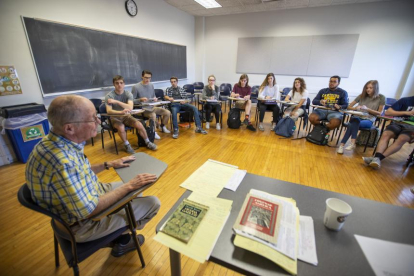Mission
The All-College Honors Program at Canisius University aims to challenge highly qualified, highly motivated students to develop intellectual curiosity and rigor, independent reasoning and creativity, superior communication skills, leadership potential, and a system for ethical decision-making. Besides challenging coursework with select faculty, the Honors Program provides its students with Honors housing (for a fee), service opportunities, and extraordinary co-curricular activities, adding significant dimensions to their academic program. The result is a close-knit scholarly community within the college that prepares its students for productive careers and rewarding lives. Consistent with this mission, we continually seek students who strive for excellence, who embrace intellectual life with energy and a sense of adventure, and who desire to pursue their academic work in diverse venues, communities, and contexts.
To learn about the Jesuit Essential Characteristics of Honors, click here.
History
The origins of the All-College Honors Program at Canisius University date to 1958. Its principal purpose was to make the campus "book-centered," a prospect that the college administration regarded as "thrilling." At that time, Fr. William Scott, SJ, dean of the faculty, proposed offering an interdisciplinary, sophomore honors seminar on the "Image of Man" in Western Culture, beginning with the Greeks. [The college was all-male at that time.]
The Honors Program began formally two years later, when Fr. Scott appointed Fr. Vincent Blehl, SJ,of the English department and Dr. George Lavere of the Philosophy department as its first co-chairs. When Fr. Blehl left the college within the year, he was replaced by Dr. Leslie Warren of the English department.
The first honors class was held in 1960 and consisted of 19 students, six in the arts, five in social science, three in business administration, three in chemistry, and two in mathematics. They had met the minimum requirements of a 3.0 GPA and a healthy appetite for "a strenuous program of collateral reading and independent thinking." Students who successfully completed the sophomore honors seminar were formally admitted to the program, which added junior and senior seminars in the following years. These honors seminars were supplemented by special courses offered by individual departments.
As an inducement to join the fledgling program, honors students were exempt in their regular coursework from attendance requirements, term papers, and final exams. To pay for additional books, the college established an Honors Program library, which purchased the required readings. Honors students developed a sense of camaraderie as they studied and gathered socially in the second floor of a home at 27 Eastwood Avenue, which was decorated for the Honors Program. The "Honors Quarters" were not to be used as a lounge, and eating and drinking were not permitted; the dean fixed a 10 p.m. curfew on the use of the honors house.
By the mid-1980s, the Honors Program had reached a crossroads. It was at this critical juncture that Robert Butler, PhD of the English department became the first Honors director and led the program to its greatest heights. He implemented a new curriculum approved by the Faculty Senate, raised academic standards, increased the program to 250 students, recruited a talented teaching corps to present unusual courses, and pursued outside funding to underwrite an impressive variety of co-curricular and extra-curricular activities. All the while, the inimitable Butler, a diehard Boston Red Sox fan and biking enthusiast, exemplified the life of the teacher-scholar. Before he left the directorship in 2006, after 21 years of exemplary service, he published several books on African American literature and received the Kenneth L. Koessler Distinguished Faculty Award.
Administration
To administer the All-College Honors Program, the college provides a budget and designates a director who is responsible to the Faculty Senate and the vice president for Academic Affairs. The Honors director works closely with the Honors Committee to establish and review procedures for the Honors Program. In addition, the Honors director convenes an Honors Student Council composed of students who plan and promote the program's social and co-curricular activities.
The Honors Advisory Committee is an advisory group of faculty and one Honors student who advise the program director on curricular and other matters. It meets at least twice a year.

